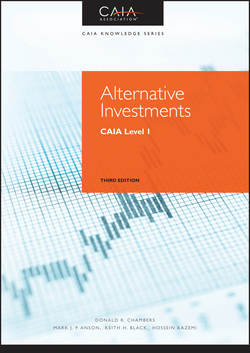Читать книгу Alternative Investments - Hossein Kazemi - Страница 34
На сайте Литреса книга снята с продажи.
PART One
Introduction to Alternative Investments
CHAPTER 2
The Environment of Alternative Investments
2.3 Regulatory Environment
2.3.2 U.S. Hedge Fund Regulations
ОглавлениеThe U.S. regulation of hedge fund registrations may be divided into two areas. The first area is regulation of securities issued to the public (the primary market), and the second is regulation of advisers to investment pools. Offers to sell securities are regulated by the U.S. Securities Act of 1933 (the Securities Act), and investment advisers are regulated by the U.S. Investment Company Act of 1940 (the ’40 Act).
In the United States, hedge funds may be unregistered, but the hedge fund manager must register as an investment adviser with the SEC. The only exemption from investment adviser registration is based on size. A manager that is too small for required SEC registration must register with its state regulator.
Hedge funds and other alternative investment pools typically avoid registration through exemptions, such as sections 3(c)1 and 3(c)7 of the ’40 Act. Both sections delineate conditions under which registration may be waived based on the perceived financial sophistication of the investors and the number of accredited investors or qualified purchasers.
The effects of using these exemptions regarding private securities include tight restriction of each fund's marketing efforts so that the fund is not viewed as offering securities to the public. Hedge funds offered to U.S. taxable investors are most commonly established as limited partnerships or limited liability companies organized in the state of Delaware. The favorable characteristics of these entity types include limited liability protection for the fund investors and pass-through of gains and losses for U.S. federal income tax purposes. Hedge funds offered to U.S. tax-exempt investors and non-U.S. investors are most commonly established as exempt companies organized offshore.
Under U.S. law, investment advisers owe a fiduciary duty to the clients they advise. The practical consequence is that advisers have an obligation to act in the best interests of the client, disclose to the client all facts that the client might consider relevant, employ a reasonable degree of care in the provision of their advice, and avoid misleading clients through either misstatements or omissions of relevant facts. In addition, the Investment Advisers Act of 1940 sets out a series of antifraud provisions to which all investment advisers operating in the United States or serving U.S. clients are subject.
Trading practices, including soft dollar arrangements, must be disclosed to clients. A soft dollar arrangement generally refers to an agreement or an understanding by which an investment adviser receives research services from a broker-dealer in exchange for a fee (such as a commission) paid out of the fund or client account. In effect, the investment adviser can receive research services, such as those provided by computerized financial information systems, by using the broker-dealer to execute the trades of its clients. Because the adviser is receiving research services in addition to brokerage services, the total commission paid by the client through the investment adviser may exceed the rates charged by other broker-dealers who simply execute trades. The practice of paying up from the lowest possible commission in exchange for research or brokerage services is protected by a specific safe harbor under U.S. law.
Federal Reserve Board leverage rules include the Regulation T margin rule, which currently requires a deposit of at least 50 % of the purchase cost or short sale proceeds of a trade (margin). An alternative investment manager, such as a hedge fund, can increase its leveraging capabilities by working around the strict requirements of Regulation T as well as NYSE, NASD, and U.S. Financial Industry Regulatory Authority (FINRA) requirements that limit leverage. This kind of maneuvering creates much of the complexity of hedge fund leveraging. Some relief from it is available to broker-dealers. By registering themselves as broker-dealers, some hedge funds have taken advantage of this rule to increase leverage to 5:1 or even higher. Another method for avoiding margin requirements is for a hedge fund to use a joint back office account. Parent broker-dealers decide what constitutes a prudent margin for an affiliate, often 5 % or less, and carry those positions on the parent's own balance sheet. Offshore broker-dealers are exempt from these regulations, even when they are offshore subsidiaries of U.S. broker-dealers. More complicated transactions can be designed to evade initial and maintenance margin rules. For example, derivative positions can be substituted for actual shares, as in a total return swap that creates synthetic ownership of securities. These transactions do not appear on a balance sheet, which can be advantageous as well. Another method of effecting leverage is by carrying out a repurchase (repo) transaction. A repo occurs when a trader borrows money backed by a security. The repo rate is the interest charged on this loan.
Finally, a recent and increasing area of regulation deals with money-laundering and terrorism-related restrictions. These laws generally expand the scope of government surveillance on banks and other financial institutions, and place greater restrictions and new penalties on institutions that fail to comply with the prohibitions and reporting rules for accounts dealing with foreign concerns or suspicious transactions.
